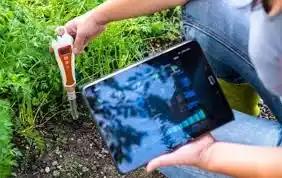The Role of Technology in Sustainable Agriculture: A Comprehensive Overview

In recent years, the agricultural sector has witnessed a significant transformation due to the integration of technology.
This shift towards sustainable agriculture has not only improved productivity but also addressed environmental concerns.
In this article, we will explore the pivotal role of technology in sustainable agriculture and its impact on the overall development of the sector.
Precision Farming
One of the key advancements in sustainable agriculture is precision farming. This technology utilizes various tools such as GPS, sensors, and drones to monitor and manage crops more efficiently.
By collecting real-time data on soil conditions, moisture levels, and crop health, farmers can make informed decisions regarding irrigation, fertilization, and pest control.
Precision farming minimizes resource wastage, optimizes yields, and reduces the environmental impact of agricultural practices.
Smart Irrigation Systems
Water scarcity is a pressing issue in agriculture, making efficient water management crucial.
Smart irrigation systems employ sensors and weather data to determine the precise water requirements of crops.
By delivering water directly to the roots when needed, these systems minimize water loss through evaporation and runoff.
This technology not only conserves water but also reduces energy consumption and lowers operational costs for farmers.
Crop Monitoring and Management
Technology has revolutionized crop monitoring and management, enabling farmers to detect diseases, pests, and nutrient deficiencies at an early stage.
Remote sensing techniques, such as satellite imagery and drones, provide detailed insights into crop health and growth patterns.
This information helps farmers take timely action, preventing crop losses and reducing the need for excessive pesticide or fertilizer use.
By adopting these technologies, farmers can enhance productivity while minimizing the environmental impact.
Data Analytics and Predictive Modeling
The integration of data analytics and predictive modelling has empowered farmers to make data-driven decisions.
By analyzing historical data, weather patterns, and market trends, farmers can optimize their planting schedules, predict yields, and manage resources effectively.
This technology enables farmers to reduce waste, improve crop quality, and maximize profitability.
Moreover, it aids in the development of sustainable farming practices by minimizing the use of chemicals and optimizing resource allocation.
Frequently Asked Questions
How does technology contribute to sustainable agriculture?
Technology plays a crucial role in sustainable agriculture by enabling precision farming, smart irrigation systems, crop monitoring, and data analytics. These advancements optimize resource utilization, reduce environmental impact, and enhance productivity.
What is precision farming?
Precision farming involves the use of technology such as GPS, sensors, and drones to monitor and manage crops more efficiently. It helps farmers make informed decisions regarding irrigation, fertilization, and pest control, minimizing resource wastage and optimizing yields.
How do smart irrigation systems benefit sustainable agriculture?
Smart irrigation systems employ sensors and weather data to determine the precise water requirements of crops. By delivering water directly to the roots when needed, these systems conserve water, reduce energy consumption, and lower operational costs for farmers.
How does data analytics contribute to sustainable agriculture?
Data analytics enables farmers to make data-driven decisions by analyzing historical data, weather patterns, and market trends. This technology helps optimize planting schedules, predict yields, and manage resources effectively, reducing waste, improving crop quality, and maximizing profitability.
Also Read: Revolutionizing Agriculture with Eco-Friendly Technology




